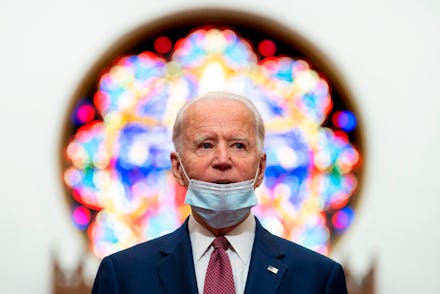Are Democrats really stuck with Joe Biden?

At this point in the run-up to the 2020 presidential election, it seems like a foregone conclusion that come November, Americans will have the choice between giving Donald Trump a second term in office, or returning Joe Biden to the executive branch, four years after his stint as Barack Obama's vice president ended.
Understandably, there are plenty of people who are none too thrilled with the prospect of voting for either of these old white men. That Trump has done a series of racist things, for which he is unrepentant, is without question. That he has fascist tendencies and is an unimaginative grifter is well established. Meanwhile, that Biden is both uninspiring and fundamentally conservative at a time when his party's base is salivating for progressive leadership isn't exactly putting wind in his campaign's sails, either.
For Republicans, there's not much they can do, other than actively vote for a different political party altogether. The RNC has not only thrown its full weight behind Trump's re-election — which is to be expected — but has worked to block even the hint of any intra-party challenge to his campaign. Barring death, incapacitation, or the astronomically unlikely event that he would suddenly step down, Trump is going to be on the ballot come November, no matter what.
For Democrats, the situation is largely similar — but not entirely. Barring some seismic shift in the dynamics of the race, Biden will almost certainly be named as the Democrats' nominee at the party's convention in August, and will be on the ballot come November. But it's not 100% a done deal yet.
There are, in fact, a few scenarios where the Democrats might not be stuck with Biden after all. Again: These are extremely unlikely. But given 2020 has proven itself to be the year where pretty much anything can happen, it never hurts to be prepared.
To begin with, let's divide the time between now and the election into two distinct parts: before and after the Democratic National Convention.
If Biden were to suddenly end his campaign, no matter what the reason might be — death, fatigue, a sheer unwillingness to go on — before the nominating convention in August, what follows would be both extremely orderly, and entirely messy. Essentially, the convention would continue as planned, with a new nominee being chosen there. Delegates technically aren't legally obligated to vote for the candidate they're bound to by the results of their state's primary, so if that candidate were to be absent from the convention, the delegates would go about picking a new nominee.
It'd be chaotic, to be sure, but essentially you'd see an entire year's worth of primary politicking and horse-trading condensed into a single convention. One thing that could help streamline the process is if Biden were to name a vice presidential pick before the convention. If he does that, it could help delegates mass around someone perceived to be the heir apparent to a nomination — but again, it's no guarantee.
If Biden goes through with the nomination but then drops out after the convention, things get much messier.
First, according to Brookings Institution Senior Governance Studies Fellow Elaine Kamarck, it's important to note that a candidate — once nominated — is essentially locked in unless they die or decide to actively cede the nomination. There's no real mechanism for ousting a nominee once they're officially nominated. This isn't to say that party officials and voters alike couldn't pressure a nominee to bow out, but ultimately, that decision rests solely with the nominee themself.
If that happens, though, here's what the DNC rules say:
In the event of death, resignation, or disability of a nominee of the party for president or vice president after the adjournment of the national convention, the national chairperson of the Democratic National Committee shall confer with the Democratic leadership of the United States Congress and the Democratic Governors Association and shall report to the Democratic National Committee, which is authorized to fill the vacancy or vacancies.
Basically, this means Tom Perez, as DNC chairman, would present some sort of plan to the full Democratic National Committee, which is comprised of "chairs and vice-chairs of each state Democratic Party Committee and over 200 members elected by Democrats in all 57 states and the territories." These several hundred members would then have their own mini-convention and pick a new nominee themselves.
Of course, this would bring with it a host of other headaches for the Democrats, who would have to justify whomever the party bigwigs choose to the voting public. Pick someone who doesn't vibe with voters, and the party risks forfeiting any excitement and momentum the previous nominee might have earned.
So, with Biden on track to become the Democratic nominee, it seems a virtual certainty that he will, indeed, be the man to face Trump come November. But a virtual certainty is not an absolute, and if past is prologue, it's probably a good idea to be prepared, just in case things get weird.